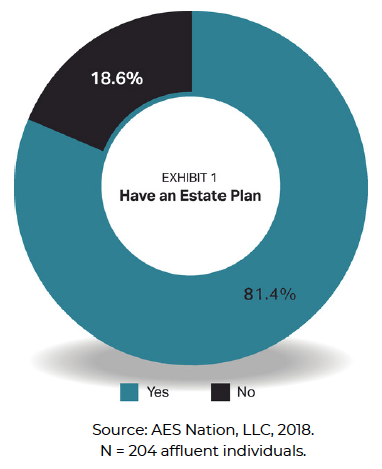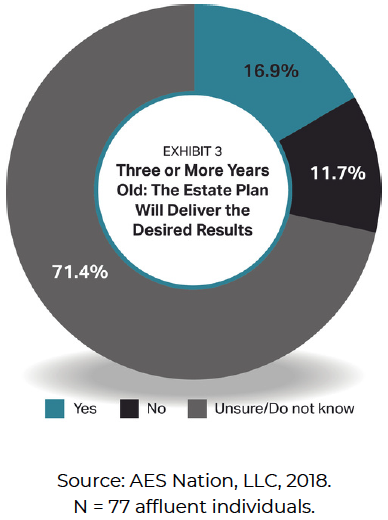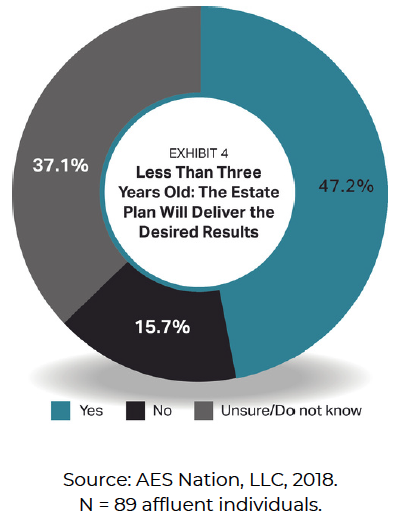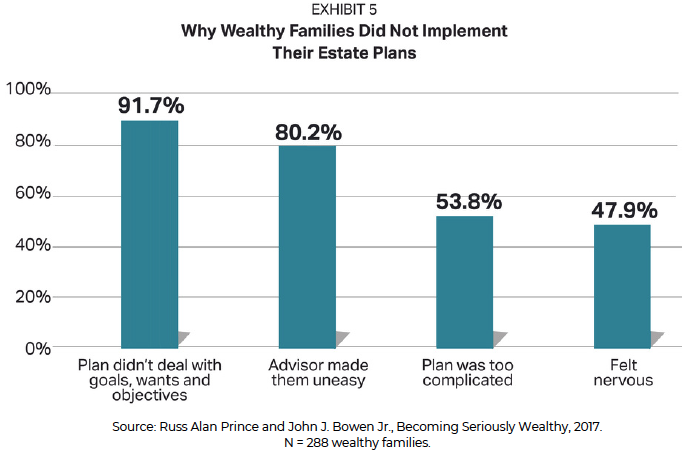Key Takeaways
- We find that most estate plans are at least three years old—and as a result, could be out of date.
- We find that many people aren’t sure whether their estate plan is still set up to achieve their desired outcomes.
- We believe it’s crucial to work with a highly capable estate planner who is also a good communicator.

Estate plans are common
First, some good news: Most people with significant wealth have done some estate planning. Eight out of ten affluent individuals (those with investable assets of $500,000 or more) in one survey by AES Nation had estate plans in place (see Exhibit 1). In that survey, an estate plan could be anything from a will to a fully comprehensive plan. Having at least a will in place should help your loved ones avoid a great deal of problems and stress when you pass on.

Most estate plans are old—and potentially outdated
Here’s the less sanguine news: Even if you have an estate plan, you may not be nearly as well prepared as you think you are for transferring wealth according to your wishes.
One major reason: More than half of the estate plans these affluent individuals have in place are more than three years old, according to AES Nation (see Exhibit 2).
Here’s why that’s a big deal—one that should raise a red flag that your plan could be outdated:
- Continual changes in tax laws mean that older estate plans may not take full advantage of current opportunities to transfer assets optimally.*
- Tax law changes also could mean that some aspects of an older estate plan
are no longer effective.* - Changes in your wealth status mean that your estate plan may no longer accurately reflect your financial situation—and your future needs and goals.
- Changes in your personal and family situation may make your estate plan ineffective in accomplishing what you actually want it to do given those changes.
* A tax professional should be consulted on all tax-related issues.
In order to attain the greatest benefits from estate planning, it’s a good idea to stay on top of your plan and revise it when appropriate—especially when new events occur that could potentially affect your wealth.
Uncertainty about effectiveness abounds
Having an old estate plan can potentially create uncertainty in a key area of managing your wealth. Example: The vast majority of individuals—71.4 percent—with estate plans that were three or more years old said they did not know whether their plan would deliver the results they wanted, according to AES Nation (see Exhibit 3).
Just 17 percent of this group said they were confident their plan would deliver the results they wanted. And a little more than 10 percent said their plan would not perform as desired.
In contrast, an updated plan can potentially provide a sense of confidence. Consider the individuals with plans that were less than three years old: Nearly half said they knew their plan would deliver the results they want (see Exhibit 4). About 15 percent said that their plan needs to be revised because it would not deliver the desired results. Fewer than 40 percent did not know or were unsure about how their plan would perform.


Those results are much better than the results for the group with the older plans—but the AES Nation data shows that a significant percentage of people from both groups are uncertain about the effectiveness of their plan.
The estate planner problem
One complication we see from these findings is an inability of many estate planners to effectively communicate with their clients. Consider one study by AES Nation of 288 wealthy families (each with a net worth of $10 million or more) that had engaged trusts and estates lawyers to design their estate plan but ultimately never signed the documents. These affluent families give a number of different explanations for their decision not to implement their estate plan (see Exhibit 5).

More than nine out of ten of the wealthy families said that the estate plan did not deal with their goals, wants and objectives. This suggests that the trusts and estates lawyers involved were unsuccessful in uncovering the families’ key, deepest issues that needed to be addressed through estate planning.
A full 80 percent of the wealthy families that didn’t implement the plans said their legal advisors made them feel uneasy. This appears to be an emotional reaction born of the professionals’ poor communication with their clients and failure to be appropriately empathetic. Even if the plans themselves may have been perfectly adequate or even ideal, the feeling the clients got from the lawyers made them stop short.
Meanwhile, just over half of the wealthy families in the study thought that their estate plan was too complicated. Estate planning for the affluent does often lead to complex and intricate strategies, in our experience. Nevertheless, this finding suggests a failure on the part of many legal professionals to communicate that complexity in a way that made sense to their clients.
Finally, just under half of the wealthy families said they did not implement their plan because they felt very nervous. This was likely due to all the other factors and a generalized feeling of not being in control in any meaningful way.
The end result in all cases: The families did not end up putting in place important strategies and protections that may have helped bring about desired wealth transfer outcomes.
While an estate planner might be exceptionally technically proficient, his or her failure to build rapport with clients will many times result in nothing getting done.
Next steps to consider
The messages from these findings that should be considered are:
- Have an estate plan in place if you want a say in where your wealth goes after you’re gone.
- Don’t let your plan gather dust in a binder, folder or drawer (or in the cloud, for that matter).
- Avoid estate planners who don’t have the necessary expertise and/or can’t communicate how a proposed estate plan will address your needs and concerns.
Your next step: If you already have an estate plan set up, you might want to stress test it to see if it is still positioned to achieve your specific wealth transfer goals (especially given some of the tax law changes in recent years). A high-caliber wealth manager can often examine an estate plan and “put it through its paces” by assessing the outcomes it would likely deliver under various scenarios. Many wealthy families regularly use stress testing to evaluate their existing strategies as well as strategies they are considering implementing.*
Additionally, it can be very beneficial to work with a highly capable estate planning professional—one who can fully grasp and navigate not just tax and estate laws but also your needs, goals and dreams for your assets. By turning to an industry-recognized estate planning expert, you may be more likely to get the results you are looking for. These experts are often thought leaders who are well known and respected by their peers.


0 Comments